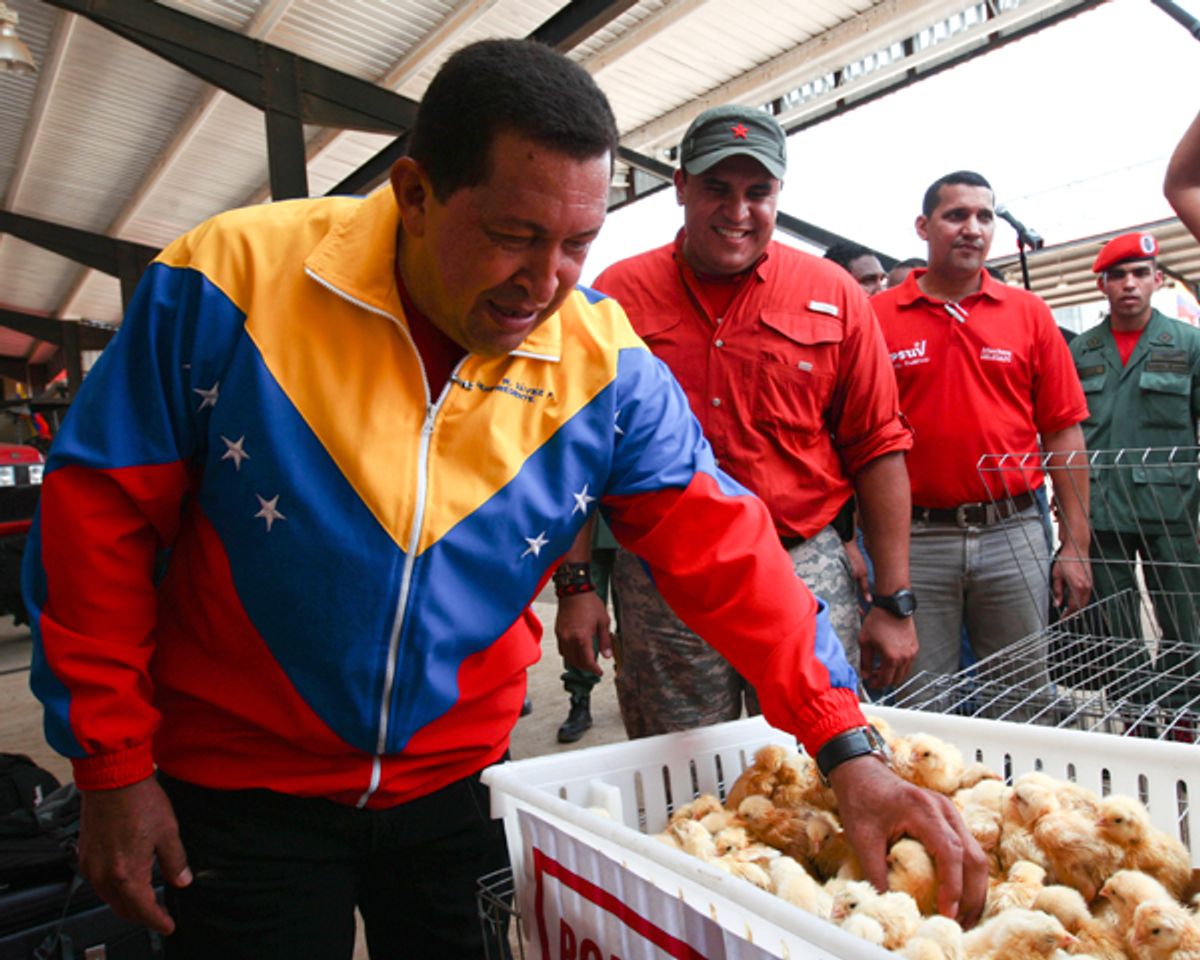 LIMA, Peru — Venezuela is on the brink of political crisis as rumors swirl that President Hugo Chavez is on his deathbed just six days before he is due to be sworn in for his fourth successive term.
LIMA, Peru — Venezuela is on the brink of political crisis as rumors swirl that President Hugo Chavez is on his deathbed just six days before he is due to be sworn in for his fourth successive term.
The 58-year-old self-styled “Bolivarian socialist” leader is suffering complications, including a severe lung infection, following his fourth cancer operation in 18 months, in a Havana hospital on Dec. 11.
He has not been seen in public since shortly before that operation. Government officials have acknowledged that his condition is serious but have refused to give clinical details, including the kind of cancer the president has or the prognosis.
The latest update on Chavez’s health came late on Thursday, when Venezuelan Information Minister Ernesto Villegas said the lung infection had triggered a “respiratory deficiency.”
That required the president to remain in “strict compliance with the medical treatment,” although Villegas gave no clues about what that treatment actually was.
He also attacked the “psychological warfare” he said was being waged by the international media to destabilize Venezuela, warning them to respect the “will of the people” expressed in last October’s presidential election, won by Chavez.
But with few expecting Chavez to be well enough to return to Caracas in time for his inauguration scheduled for next Thursday, the opposition is demanding government officials acknowledge the gravity of the president’s condition and the power vacuum it has created.
Ramon Guillermo Aveledo, general secretary of the Democratic Unity coalition, which draws together a wide spectrum of opposition parties, has called for Chavez to be temporarily replaced.
“The real truth of the situation regarding the health of the president must be told given that it is a national problem because this deals with the leader of the country,” he said. “Rumors are the offspring of misinformation and that’s where the instability begins.”
That prompted Vice President Nicolas Maduro to accuse Aveledo of being behind “twisted campaigns” in social media aimed at subverting the government.
Nevertheless, Aveledo’s stance — avoiding calling for Chavez to step down permanently — appears a major concession to the government, possibly in a tactical attempt to prevent grieving Chavez supporters from turning on the opposition in any future vote.
It also flies in the face of how most commentators interpret the constitution — drawn up in 1999 by a constituent assembly dominated by Chavez supporters.
They have said presidential elections must be held within 30 days if the president dies or is incapacitated in the first four years of his term. The same is also true if an elected president is unable to be sworn in.
The only difference is that in the former scenario the vice president, Maduro, a former bus driver and union leader, would stand in for the president until a newly elected leader takes office. In the latter, the speaker of the Venezuelan congress would do so.
Either way, the stand-in president would hold the highest office for just one month — unless he or she also ran in and won the election.
That raises the possibility that, if Chavez is unable to be sworn in, Maduro will call new elections in the next week or so — or risk plunging the country into a major political crisis.
The current speaker is Diosdado Cabello, like Maduro a veteran Chavez ally, who, as a paratroop officer, took part with the future president in a failed coup in 1992.
Widely viewed as a hardliner, Cabello is also seen by some analysts to be the member of Chavez’s inner circle most likely to break ranks and challenge the president’s wish that Maduro be his political heir and the “Chavista” candidate in any future presidential elections.
From his Twitter account, Cabello warned this week: “Information for the leaders of the Venezuelan opposition, we Chavistas have it very clear what we will do, worry about what you will do.”
And in a subsequent tweet, he added ominously: “Sadness is not weakness.”
Yet one person who, so far, is not taking the bait or falling into the political trap of prematurely demanding new elections is Henrique Capriles, the state governor who, running for Democratic Unity in October’s presidential elections, gave Chavez his toughest race yet.
Since Chavez’s health deteriorated, the 40-year-old basketball-playing centrist, who won 44 percent to Chavez’s 55 percent, has been limiting himself to sending out positive messages on his Twitter account.
These have included calling on Venezuelans to “love thy neighbor,” apparently a reference to the ailing president.
The nearest Capriles has come to commenting directly on the constitutional dilemma triggered by the president’s sudden deterioration came in another, cryptic tweet: “The answers in the face of the uncertainty generated by the government are in the constitution.”
Barring a sudden, miraculous recovery from Chavez, it may well become clear within the next week whether those answers include another presidential race in February for this deeply polarized South American country.



Shares